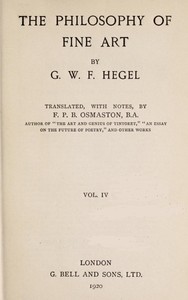The Philosophy of Fine Art, volume 4 (of 4) by Georg Wilhelm Friedrich Hegel
"The Philosophy of Fine Art, Volume 4" by Georg Wilhelm Friedrich Hegel is a philosophical treatise discussing the nature of art, specifically focusing on poetry and its distinction from other forms of artistic expression, written in the early 20th century. This work explores the relationship between poetry and other arts, emphasizing its unique capacity to convey spiritual and ideal concepts while utilizing language as its primary medium. Hegel seeks to analyze how
poetry integrates content from both the subjective and the objective realms, aiming to articulate the complexities of human experience through idealized expression. The opening of the book introduces the concept of poetry as a critical form of art that synthesizes elements from both the plastic arts and music. Hegel elaborates on how poetry serves as a medium capable of transcending the limitations of mere sensory perception, allowing the imagination to explore the inner workings of spirit and consciousness. Unlike painting and music, which are bound by their material forms, poetry's versatility enables it to articulate the nuances of human emotion and thought in a manner that is not confined to visual or auditory representations. The text sets the stage for a deeper examination of poetic composition, exploring its differentiation from prose, historical evolution, and the distinctive artistic qualities that characterize poetical expression. (This is an automatically generated summary.)
Read or download for free
| How to read | Url | Size | |||
|---|---|---|---|---|---|
| Read now! | https://www.gutenberg.org/ebooks/55731.html.images | 987 kB | |||
| EPUB3 (E-readers incl. Send-to-Kindle) | https://www.gutenberg.org/ebooks/55731.epub3.images | 533 kB | |||
| EPUB (older E-readers) | https://www.gutenberg.org/ebooks/55731.epub.images | 546 kB | |||
| EPUB (no images, older E-readers) | https://www.gutenberg.org/ebooks/55731.epub.noimages | 423 kB | |||
| Kindle | https://www.gutenberg.org/ebooks/55731.kf8.images | 822 kB | |||
| older Kindles | https://www.gutenberg.org/ebooks/55731.kindle.images | 748 kB | |||
| Plain Text UTF-8 | https://www.gutenberg.org/ebooks/55731.txt.utf-8 | 863 kB | |||
| Download HTML (zip) | https://www.gutenberg.org/cache/epub/55731/pg55731-h.zip | 496 kB | |||
| There may be more files related to this item. | |||||
Similar Books
About this eBook
| Author | Hegel, Georg Wilhelm Friedrich, 1770-1831 |
|---|---|
| Translator | Osmaston, Francis Plumptre Beresford, 1857-1925 |
| Title |
The Philosophy of Fine Art, volume 4 (of 4) Hegel's Aesthetik |
| Note | Wikipedia page about this book: https://en.wikipedia.org/wiki/Lectures_on_Aesthetics |
| Credits |
Produced by Laura Natal Rodriguez & Marc D'Hooghe at Free Literature (online soon in an extended version,also linking to free sources for education worldwide ... MOOC's, educational materials,...) (Images generously made available by the Internet Archive.) |
| Reading Level | Reading ease score: 36.9 (College-level). Difficult to read. |
| Language | English |
| LoC Class | N: Fine Arts |
| Subject | Aesthetics |
| Category | Text |
| EBook-No. | 55731 |
| Release Date | Oct 11, 2017 |
| Copyright Status | Public domain in the USA. |
| Downloads | 193 downloads in the last 30 days. |
| Project Gutenberg eBooks are always free! | |

